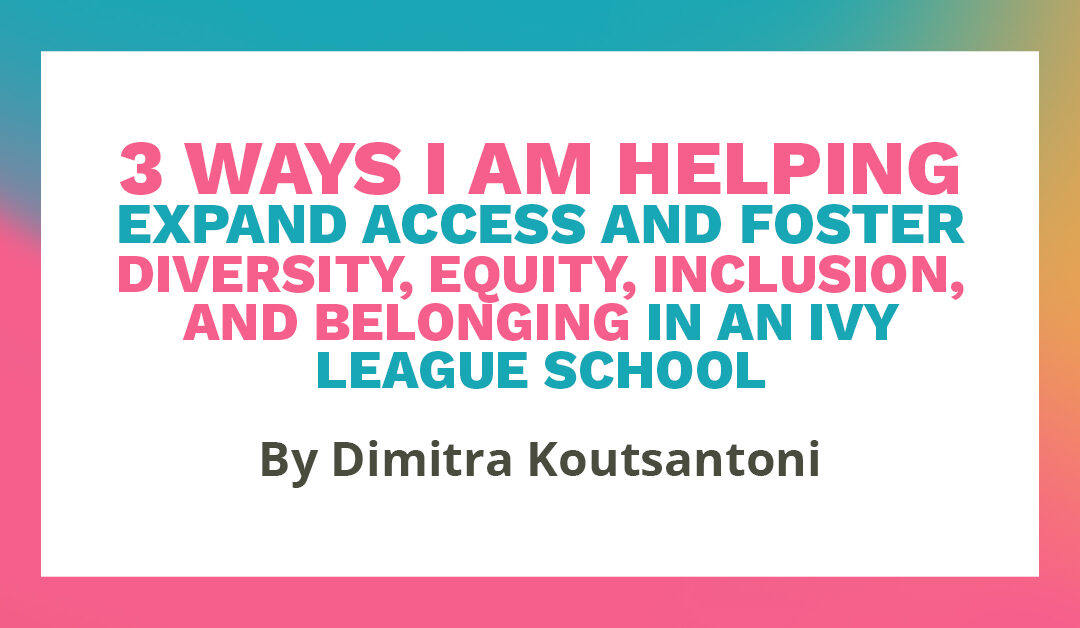By: Dimitra Koutsantoni, PhD, Senior Director of University Corporate and Foundation Relations, Columbia University
Inspired by CCF’s 10 Principles of Community-Centric Fundraising, I have reflected on how I champion DEIB in my role, and wanted to share my strategies with other higher education Corporate and Foundation Relations (CFR) professionals.
Some years ago, at an academic conference in the UK where I was presenting a paper based on my doctoral research, I was talking to another conference participant (a white, British woman) during a break. A few minutes into our professional conversation, she asked: “So where is your accent from?” Once I responded that I was born in Greece, I got (the usual) comments on Greek islands and summer holidays.
I was no longer a fellow researcher but an exotic foreigner.
To say that this scenario has not been replayed in business settings hundreds of times would be a lie. Such microaggressions at a professional setting never fail to alienate me, challenge my sense of belonging, and “other” me. They make me feel like a perpetual foreigner, and can be patronizing as they reduce my identity to a national stereotype. This “othering” is compounded every time my non-English-sounding name is mispronounced in a meeting or misspelled in a business email.
I work in an Ivy League school building relationships with foundations and corporations and raising funds for institutional strategic initiatives, programs, and faculty research. The Ivy League is notorious for being exclusive and has a well-documented underrepresentation of students and faculty of various marginalized groups. My university is trying very hard to address this and has numerous programs and initiatives aiming to expand access and advance diversity, equity, inclusion, and belonging (DEIB).
Being an immigrant, and also a woman, and first-generation college and doctorate graduate, I can identify with inclusion and access barriers and struggles of faculty, researchers, and students from systemically marginalized groups. I am driven by my lived experience to center DEIB in my work and support these programs, beyond fundraising.
Inspired by CCF’s 10 Principles of Community-Centric Fundraising, I have reflected on how I champion DEIB in my role, and wanted to share my strategies with other higher education Corporate and Foundation Relations (CFR) professionals.
Why I champion diversity, equity, inclusion and belonging in higher education
As a first-generation college and doctorate graduate coming from a low socioeconomic background, I have experienced first-hand the challenges of accessing and persisting through college and graduate education due to a lack of role models, support systems, and limited financial resources. Unlike most people’s linear journey from college to graduate school, to post-doctoral research, and to faculty appointments, it took me years after graduating from college in Greece to figure out a pathway to graduate school in the UK.
I had no knowledge of what funding was available or how to access any scholarship opportunities, and no guidance on how to navigate the graduate school space and even put together my application.
After my graduation, as a woman in the social sciences trying to penetrate academia, I had direct experience of gender bias in publishing scholarly research. The academic publishing system shows a systematic underrepresentation of women as authors, referees, and editors; men publish more manuscripts and in more prestigious journals due to gender bias in both peer and editorial reviews.
I also experienced the double gender-and-“foreign-born” bias when trying to obtain academic and later alternative academic (Alt Ac) appointments. I was faced with preconceived notions of merit and competence based on my gender, where I went to school and college, country of origin, first language, and accent.
This is why as a DEIB champion in my current Alt Ac career in Corporate and Foundation Relations, I mainly focus my efforts on supporting and empowering faculty, researchers, and students from groups historically excluded in higher education and in research.
When considering what groups fall under this category, I consider race, ethnicity, culture, gender, gender identity and expression, sexual orientation, socioeconomic status, religion, spirituality, disability, age, national origin, immigration status, and language. By using an inclusive definition, I can make sure I support my institution’s full range of diversity.
People from these groups have historically been excluded from higher education (and elite institutions in particular) due to legacies of oppression and discrimination. Racial, gender, ethnic, and other disparities in college attainment and graduation, research funding, scholarly publishing, faculty pay, promotion, tenure, and leadership opportunities are real and well-documented.
My efforts are centered around three areas:
- Helping my institution’s outreach and pathway programs with local K-12 schools secure funding, grow, and expand their reach.
- Working with faculty and researchers from historically underrepresented groups on approaches and proposals to foundations.
- Ensuring funding proposals are centered around diversity, equity, inclusion, and belonging.
1. Outreach and pathway programs
These programs bring middle and high school students from low-income neighborhoods and under-resourced schools to campus, involve them in research labs, and expose them to knowledge and enrichment opportunities (lectures, workshops) that would not otherwise be afforded to them. They also support first-generation college-bound youth to help ensure their success to, through, and beyond college by providing college and career counseling.
This work is particularly meaningful to me. I did not have access to such opportunities while at school and recognize their enormous value, and the power of higher education to transform lives. I support such programs by:
- Connecting their leaders with my contacts at foundations to start discussions and explore interest in funding them. These contacts can be my institution’s alumni, or program officers I have worked with before.
- Inviting my contacts at foundations to come to campus, visit the programs, see their work in action, and meet the students.
- Using LinkedIn to promote their work and make it known to the foundation leaders that follow me.
- Working with them to develop promotional materials, brochures, and annual reports.
- Supporting them with their funding proposals and applications.
2. Approaches and proposals to foundations
Researchers from historically underrepresented groups are less successful in securing competitive funding from both federal agencies and private philanthropic institutions. Limited access to mentoring, lack of diversity among grant reviewers, reviewers’ perception of scientific merit, previous record of getting funding, and lack of connections are some of the reasons.
Many foundations offer prestigious awards that can boost a researcher’s career, but early career faculty, doctoral students, and postdoctoral scholars are often left to their own devices to identify and apply for such awards, with no guidance on how to build and navigate relationships with sponsors or how to pitch their proposals to such funders.
Having been in that position myself and having experienced such challenges, here’s how I support them:
- I research and disseminate fellowships, scholarships, career development awards, or prizes for faculty and students from historically underrepresented groups, awards that recognize DEIB leadership, or awards that fund research on DEIB-related topics.
- I help researchers from historically underrepresented groups understand foundations’ expectations, shape their proposals, and review and edit them making sure they frame them in ways foundations find compelling.
- I connect them with foundation program officers to discuss their work and explore fit with the foundation’s interests.
- I partner with them on stewardship and work with them to produce progress reports that effectively demonstrate the impact of their work, which can lead to continued funding.
- I celebrate their successes and promote their work with features in my newsletter and with posts on LinkedIn.
3. Ensuring funding proposals are centered around DEIB
While working on funding proposals, I often see DEIB mentioned in a few lines at the end of the proposal document as an afterthought and a box to be checked. Instead, every aspect of a proposal should incorporate DEIB principles.
I focus on representation and inclusive language by:
- Working with project teams to ensure that individuals from historically underrepresented groups are represented in every step of a project design, in research teams, in leadership roles, in project advisory boards, as study participants, and as partners in research. I have developed a checklist that I share with research teams to help them with this effort.
- Helping teams think about access and inclusivity when organizing events and conferences, disseminating results and outputs, and demonstrating a proposal’s DEIB impact.
- Advising teams to include equitable pay for post-doctoral and student researchers in their budget, and build mentorship and professional development plans for them.
- Ensuring proposals use equitable language that does not reinforce discriminatory biases, does not “other,” acknowledges diversity, and creates a sense of belonging. I find the APA guidelines very helpful and I am in the process of collecting various resources for the development of good practices and guides around inclusive language, which I will share with faculty and partners across campus.
It’s a work in process
This kind of work may not have immediate success results. It may fall outside “dollar metrics.” It may not bring large, transformative gifts and grants. It may not neatly fit capital campaign goals. But the work is deeply rewarding, important and impactful. It can make a difference one grant at a time, one person at a time.
Long term, it can help dismantle the systems of exclusion and discrimination in the Ivy League and higher education, in general. It can help build a culture of inclusion and belonging on campus, address disparities in research funding, build pathways to academia, expand access, and develop the next diverse generation of scientists, scholars, and leaders.
I urge my colleagues in the higher education CFR space to join me in adopting CCF’s principle of grounding our fundraising in race, equity, and social justice and use our skills for social good and the creation of an equitable world.

Dimitra Koutsantoni
A social scientist by training, Dimitra Koutsantoni (she/her/hers), has had a diverse career trajectory spanning education, research, research administration, and university development in Greece, U.K. and the U.S. She has a PhD in Sociolinguistics and has published a research monograph, peer reviewed journal articles, and higher education policy papers.
Dimitra has worked extensively with corporations and foundations in philanthropic support of higher education initiatives. She currently serves as the Senior Director of University Corporate and Foundation Relations at Columbia University, working to develop and deepen partnerships with foundations and corporations in support of university strategic initiatives, programs and faculty research. Her work is centered around social justice and the advancement of diversity, equity, inclusion and belonging.
You can connect with her on LinkedIn
Discover more from CCF
Subscribe to get the latest posts sent to your email.

